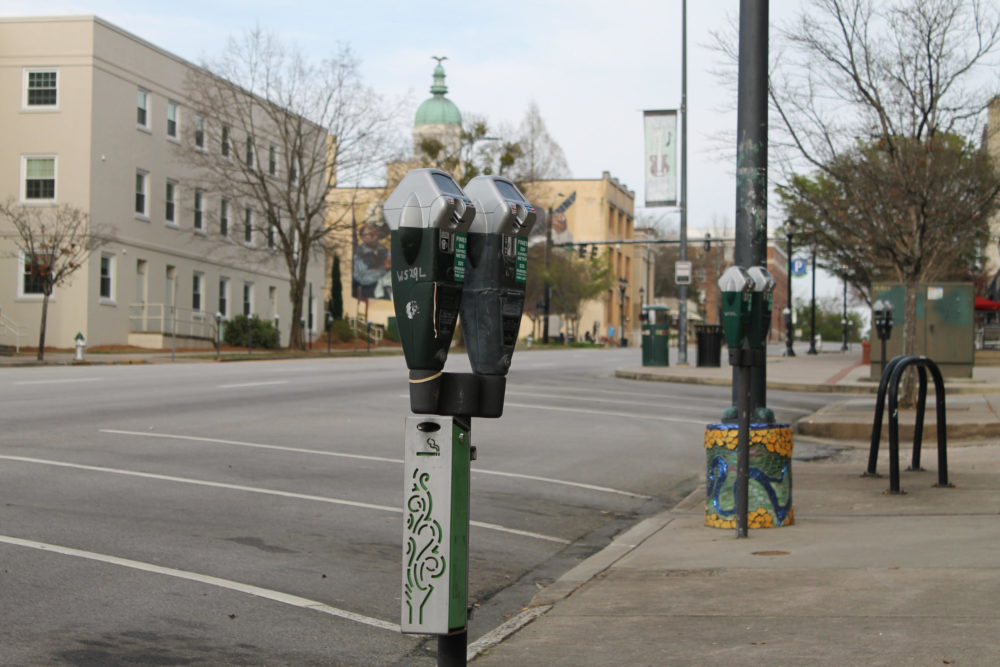By Madeline Laguaite
Peter Dale, a restaurateur and chef born and raised in Athens, had never seen anything like it. On Monday, the streets of Athens were empty. The University of Georgia’s campus was silent.
“Last week, UGA was on spring break, so it was already a quiet week. But it was extra quiet,” said Dale, owner of downtown Athens’ Mediterranean-themed restaurant, The National, which has been closed since Monday amid fears of COVID-19.
Restaurants like his, usually busy with the lunch rush, sat quiet and mostly deserted.
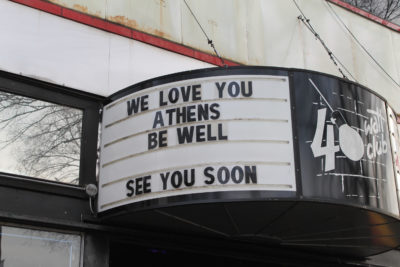
“That kind of made it a little scarier,” Dale said. “Because we knew that something was coming.”
With fewer and fewer people coming in, sales are down significantly. Some of Dale’s restaurants switched to curbside pickup and delivery. But some employees are struggling, because there are fewer tips to supplement their income.
“I think we’re going to get through it,” Dale said. “But it’s going to be tough.”
Last week, the World Health Organization officially deemed COVID-19 a pandemic. In the past two weeks, the number of cases outside China — the country where the disease was first identified in December — has increased 13-fold, and the number of affected countries has tripled. Scenes from a few weeks ago of bustling cities in China and South Korea becoming “ghost towns” are now being replicated in Europe, and in parts of the United States.
The number of confirmed cases in Georgia is now more than 190, according to the Department of Public Health’s daily status tracker.
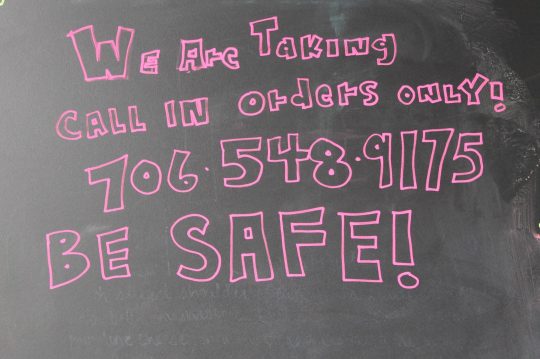
Five cases of COVID-19 are confirmed in Clarke County, according to the Georgia Department of Public Health. At least one of these patients is being treated in a local hospital.

As in other communities across the nation, the Athens mayor and local commissioners have been scrambling to figure out what to do to ensure the safety of residents. On Monday, they held an emergency meeting to discuss coronavirus preparedness, as well as the potential prohibition of gatherings and forced curfew.
Discussions grew tense as they decided on a voluntary curfew from 9 p.m. to 5 a.m.
“It’s not perfect. But we are facing an unprecedented pandemic crisis, right now,” declared District 7 Commissioner Russell Edwards, noting the limited number of intensive care beds in and around Athens.
“If we do not act decisively to halt and arrest the spread of this virus, these ICU beds will be overwhelmed. Doctors will have to decide who gets a ventilator and who doesn’t.”
The following day, Mayor Kelly Girtz issued a call for Athenians to limit gatherings to 10 people and to shelter in place for 24 hours, seven days a week.
Additional measures were added: The Athens-Clarke Commission approved mandatory social distancing — keeping at least six feet apart — and a “shelter-in-place” order. The shelter-in-place, which had previously been voluntary, instructs staying at home except for essential purpose, the Athens Banner-Herald reported.
Hospitals practice and plan
Hospitals across the United States have been advised by the CDC to prepare to provide care for patients with confirmed or suspected COVID-19, but also to get ready for a large number of patients.
In Athens, the health and medical community has been preparing since the early stages of the outbreak by updating its preparedness plans, staging mock scenarios and providing staffers with special training.
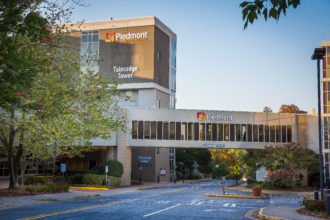
Nationally, there are fears of hospitals running out of personal protective equipment such as masks. St. Mary’s Hospital in Athens has conservation measures in place and is following CDC guidance on alternatives, according to public relations manager, Mark Ralston. Day-to-day updates have turned into a continuous flow of information, including updates from the Trinity Health System at least twice a day.
Sherry Ann Ward, a registered nurse who directs employee health services at St. Mary’s, said the hospital’s initial responsibility to COVID-19 patients is threefold: identify, isolate and inform. A patient with coronavirus symptoms who shows up at an emergency room will be given a surgical mask and isolated, in keeping with instructions from the Georgia Department of Public Health and the CDC.
Health care workers in close contact with patients will each wear an N95 mask, the type that filters what a person breathes in. Other clinical staffers will wear standard surgical masks, the type that limit the wearer’s germs from reaching others. It’s important to protect the health of medical personnel as much as possible to ensure a workforce that can cope with large outbreaks.
At Piedmont Athens Regional Medical Center in Athens, a core group of infection “preventionists” has been meeting regularly to prepare the hospital’s coronavirus response. That team reviews the latest information from federal health officials, then reviews the hospital’s existing strategies in light of that information, to identify any potential weak points.
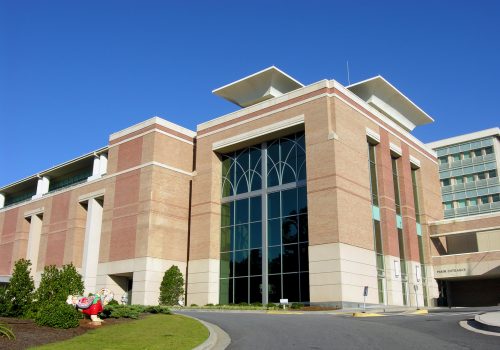
Clinicians at Piedmont Athens have also participated in simulations and drills, especially to make sure health care providers are putting on and removing their personal protective equipment properly and using such gear as N95 respirators correctly, said Candace Wiercioch, a registered nurse and the director of cardiac and critical care services.
“We already know how to defend ourselves with airborne diseases,” added McKenna Parker, a registered nurse and an infection prevention nurse.
Both St. Mary’s and Piedmont Athens have negative pressure rooms — hospital rooms in which harmful airborne pathogens like bacteria and viruses can be contained without circulating to the rest of the facility. These rooms are often used to house patients with airborne infectious diseases like tuberculosis or measles. Now they may be used for COVID-19 patients.
Piedmont also has two intensive care units, or ICUs, which have a total of 36 critical care beds. These can also be used as an effective isolation unit, partly because they’re locked and have a minimal number of staff. That can help protect patients with COVID-19.
“People are curious. And so, having the patient in a locked unit, it helps control that,” Parker said.
Experts from both Piedmont and St. Mary’s recommend that people with serious symptoms go to a hospital or call 911. Serious symptoms can include difficulty breathing and/or a dangerously high fever (104 degrees Fahrenheit or more in adults; 102 degrees Fahrenheit for children).
People whose symptoms aren’t so serious, but who think they may have COVID-19, should call their doctor or urgent care clinic first. “We don’t want people to go into health care [facilities] unless their symptoms get to the point that they can’t handle them at home,” Ward said.
A new normal
Controlling the spread of COVID-19 isn’t easy, though some nations seem to be doing it better than others. In this country, including in Athens, the situation has evolved rapidly.
On Thursday, March 12 — just hours after announcing that classes would resume as normal at the 26 University System of Georgia institutions — system officials reversed course, and the University of Georgia suspended classes for two weeks. Like other schools, UGA will be moving classes online to maintain new social distancing norms.

Students will not be permitted to return to campus to retrieve their belongings, the email stated. USG will provide guidance to its campuses regarding refunds for services such as housing and dining, but students are advised to “wait for their campus to contact them.”
Gov. Brian Kemp signed an executive order on March 16 to close all public elementary, secondary and post-secondary schools in Georgia through March 31.
Earlier this month, President Trump declared a national state of emergency, freeing up federal resources for a broad array of programs. The CDC in Atlanta has advised communities nationwide to combat the spread of the virus by encouraging people to practice “social distancing.” That means avoiding close contact with other people — especially face-to-face contact.
Social distancing, which includes avoiding even small crowds, is rapidly becoming the new normal. Many private businesses and organizations, as well as government entities, have changed their practices to limit people from close contact with each other.
The ultimate goal of keeping people apart is to “flatten the curve” of COVID-19 cases — slowing down the rate of new infections so people with the disease don’t overwhelm the health care system.
Given past diseases, what’s so different about COVID-19? It spreads fairly easily, and there are no specific medical treatments for it. And unlike with the flu, there is no vaccine for this virus yet. While most people who get the disease will have mild cases and recover, it’s particularly dangerous to older people and those with prior medical problems. And it may be more deadly than the flu, though much remains to be known about how it will act on a global scale.

Edwards, the commissioner for Athens-Clarke County, emphasized the potential danger during a Mayor and Commissioner emergency meeting on March 16. “We just want people to shelter in place,” Edwards said. “This ain’t a bad flu. This ain’t a hoax.”
For Dale, the abandoned streets and restaurants of Athens are reminiscent of the 2008 stock market crash, and the financial disaster that followed. Those times were frightening and uncertain, he said, but because the university remained open, Athens felt more insulated than other Georgia cities. To him, the current situation feels different.
In his announcement Tuesday, Mayor Girtz said bars and restaurants will be required to limit the number of people on site to 10 or fewer (including staff), but he encouraged residents to continue to use curbside and delivery services to support local businesses.
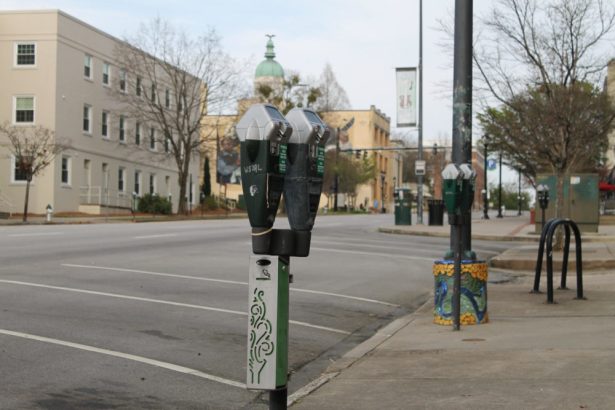
“For them, every dollar matters,” Girtz said. “So the more business you give them . . . the more it’s going to contribute to our entire community.”
Three restaurants Dale has a hand in — The National, Condor Chocolates and Seabear Oyster Bar — are closed for the time being. His other restaurant, Maepole, is taking online orders only.
But the longer the restrictions are in place, the more difficult it will be to keep the doors open.
“There’s people who have money now, but in a couple months, this will probably land on their doorstep,” Dale said. “Nobody’s immune from this.”
Policymakers everywhere share similar fears. The spread of the new coronavirus has already devastated the international economy, and in this country the White House and Congress are seeking to fast-track measures to protect businesses, workers and families.
Georgia leaders are having the same urgent discussions.
Madeline Laguaite is a freelance journalist and a health and medical journalism graduate student at the University of Georgia. She is particularly interested in LGBTQ health and public health. She has a public/professional Twitter at @MLaguaite and a portfolio at www.madelinelaguaite.com.
Contributing to this report are Jillian Tracy, Andi Clements and Brittany Carter, journalism students at the University of Georgia who are enrolled in an introduction to health and medical journalism class for Spring 2020.

